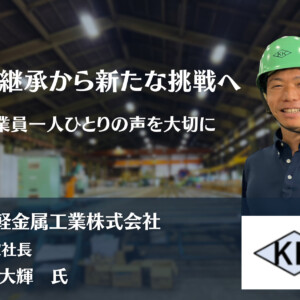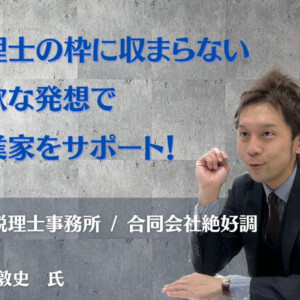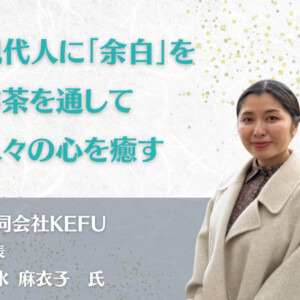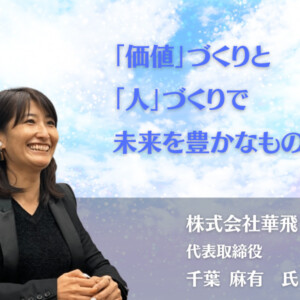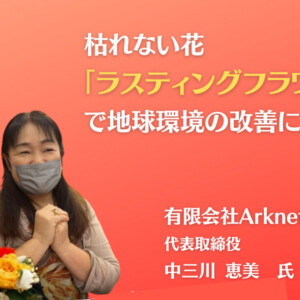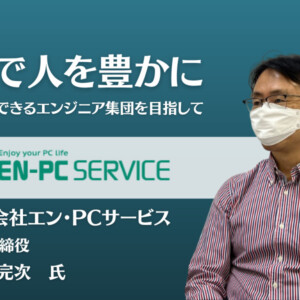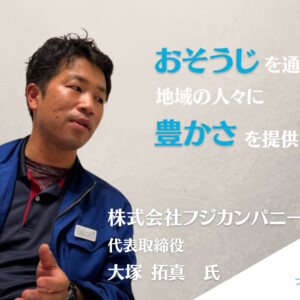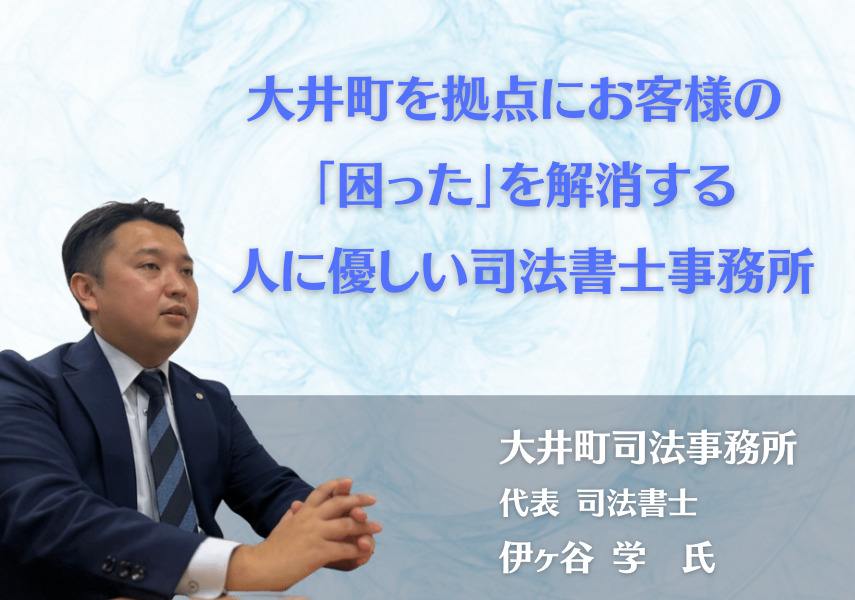
Oimachi Judicial Affairs Office: A Client-Friendly Judicial Scrivener’s Firm Based in Oimachi, Solving Your Legal Troubles
In Japan, there are various legal procedures based on the law. Many of these procedures present a high barrier for individuals who are not experts. Judicial scriveners come to the rescue in such difficult situations. Judicial scriveners may not be very visible in the public eye, but they are the unsung heroes who provide strong support behind the scenes. This time, we shine a spotlight on Mr. Igaya, the representative judicial scrivener at Oimachi Judicial Affairs Office in Oimachi, Shinagawa-ku, Tokyo.
We would be pleased if you could deepen your understanding of the profession of judicial scriveners and get a touch of the wonderful philosophy of Mr. Igaya.
About the Business of Oimachi Judicial Affairs Office

Could you please tell us about your business first?

Oimachi Judicial Scrivener’s Office is a judicial scrivener’s office that I (Igaya) and Miyama started. Our primary principle in business is to do everything that we can as judicial scriveners. This includes registration procedures related to changes in real estate rights (sales, inheritance), company registrations, post-establishment company officer changes, capital increases, and registration procedures for issuing stock options. For corporate clients, we also focus on specialized legal checks, consulting services, and business succession.
About the Reason for Starting the Business

I understand that you were a self-reliance support counselor. Could you tell us what ultimately led you to pursue a career as a judicial scrivener?

I was self-employed after working at a facility supporting the independence of homeless people. It was a bit of a floundering time for me (laughs). I wanted to acquire a solid qualification and ultimately chose to be a judicial scrivener as my profession. After various experiences as a working adult, I came to want to obtain a legal qualification. While most might think of “lawyer” when it comes to legal qualifications, becoming a lawyer requires a qualifying examination and takes at least three years. So, I decided to aim for the pinnacle among qualifications that do not require an exam qualification, which led me to obtain my judicial scrivener qualification.

Were you interested in law from the beginning?

Not at all. I didn’t graduate from the faculty of law either… When I decided to aim for it, I was already married, so there was no turning back. I thought I would give up if I failed three times, but I passed on the third try. I was also very lucky. Since I wanted to be independent as a professional, I got a job at a judicial scrivener’s office with the intention of becoming independent, and then I became independent as planned.
About the Most Moving Event Experienced

Could you share with us the most moving event you’ve experienced in the course of running your business?

私の仕事上だと個人情報に触れることが多いので、どうしてもお話するのが難しいかなと思うこともあるのですが・・・
In my line of work, I often deal with personal information, so it’s sometimes difficult to discuss specific cases, but… I was able to experience the approval of a special adoption that I thought was absolutely impossible. That was truly moving.
There are two types of adoption: “ordinary adoption” and “special adoption.” Special adoption severs the ties with the biological parents. It’s a method used, for example, by couples who can’t have children. Remember the baby hatch that became famous for a while? That’s used for special adoptions. Special adoption is a system to match such children with childless parents, but in this case, the child to be adopted was a stepchild of the client.
They didn’t want to go through ordinary adoption and requested a special adoption. After researching all the precedents, the conclusion was that it was nearly impossible, but we decided to give it a try, and the judgment was passed.

Were there any opposing forces in conducting a trial with no precedent?

Yes, there were. Before going to the judge, the court clerk, upon reviewing past precedents, suggested that such a case would not receive a judgment and it would be better to withdraw it.
However, there was a strong request from the client who said, “I don’t want to give up until the end. Even if the judgment does not come through, I want to go as far as I can,” so we decided to help. In the end, the judgment was passed.

How do you feel when you encounter a case that is unprecedented?

When clients come to us judicial scriveners in trouble, we naturally want to help them out in any way we can.
Apart from registration work, we can also create documents used for filing with courts. We will continue to perform the work that is recognized as part of a judicial scrivener’s duties. In cases where we alone cannot resolve the issue, such as tax matters, we will connect clients with trustworthy tax accountants.
Also, if it gets to a dispute situation where it has to be fought in court, we would refer to lawyers. I hope to provide a stage where I can fully utilize the network I have built for our clients.

Do most people who come for consultations feel desperate?

Yes, that tends to be the case often, especially with inheritance-related cases lately, where there’s a desire to buy or sell real estate when someone is on the verge of dementia.
To conduct real estate transactions, identification of the seller is required. However, when the seller is in the early stages of dementia, confirming their identity becomes very difficult, yet accurately confirming the seller’s “intention to sell” is the job of a judicial scrivener.
For instance, I recently had a request from a son who wanted to sell real estate owned by his father, who is suspected of having dementia. The sale cannot go through if the father’s intention is not confirmed, no matter what the son says. This is where the importance of a judicial scrivener’s personal identification comes in.
But it’s not that simple. We, who are not medical professionals, must ultimately give the final go-ahead for personal identification, and we may only get about 10-20 minutes to meet with the father. We must perform personal identification correctly within such a limited time.

It seems like a very difficult job. Are there any requests that you just can’t handle?

Clients come to me because they’re in trouble, and while I want to help them, there are cases where we have to decline if they’re too difficult. If we don’t handle these properly, it would ultimately inconvenience the clients.
I believe judicial scriveners are there to enable high-value transactions to be conducted with confidence, so I think the work of personal identification, like this case, is really important.
About the Toughest Episode Faced

Given all the difficulties you’ve mentioned, have you ever felt like giving up on being a judicial scrivener?

I’ve never wanted to give up. There’s a lot of gratification in what I do. While there’s a lot to research and many challenges, it’s all for the sake of our clients, so I give it my all.
Building trust with clients is crucial, especially for cases that extend over a long period. Being able to coordinate effectively is vital in our profession to the point where it’s said that ‘coordination is part of a judicial scrivener’s job’. In real estate sales, for instance, properties purchased with a loan must be sold with the loan intact, which requires coordination not just between buyer and seller but also with the bank that issued the loan, as well as with real estate agents involved in the transaction.
Coordination is key, and all these parties need to work closely on the day of the sale to complete all the necessary procedures, including registering with the bank and acquiring documents from government offices. Effective task management and scheduling are essential, and good preparation makes up 90% of the work.

I believe you started the Oimachi Judicial Affairs Office after leaving the judicial scrivener’s office where you previously worked. Could you share any challenges you faced during the setup?

It was quite the physical labor. We built the interior of this office ourselves, which was quite challenging. We selected and assembled office furniture, PCs, printers, etc., on our own, and we also created the opening announcements ourselves. We designed the layout for efficiency and based the furniture placement on that, resulting in the current arrangement.

There are shared offices that come with furniture. Did you consider using such a place?

We thought that would be boring, so we decided to do everything ourselves (laughs). Knowing the process of setting up also helps understand the struggles one might face when starting a new business. Financially, my partner Miyama and I had enough funds, but we also tried borrowing money from Japan Finance Corporation to experience what it’s like. Through setting up the office, we’ve come to understand the challenges involved in creating a new firm.
About Future Vision

Finally, could you share your vision for the future?

I would like to focus on helping with ‘inheritance’ for the deceased and ‘business succession’, which is like inheritance for companies. Especially since we have set up our office in this area (Oimachi), I think a lot about becoming a judicial scrivener’s office that can be of service to the people of the local (Jonan) area.
Even for minor issues, I want to be an office that says, “Just email or call us, we’ll answer anything!” Consultation fees are not a concern, so please feel free to reach out.
The Oimachi Judicial Affairs Office is a firm that Miyama and I established. I believe that together we can reach places I could not reach alone. Moving forward, I hope to continue working with Miyama to help everyone, so I ask for your continued support.
From the Editorial Department of Comtri
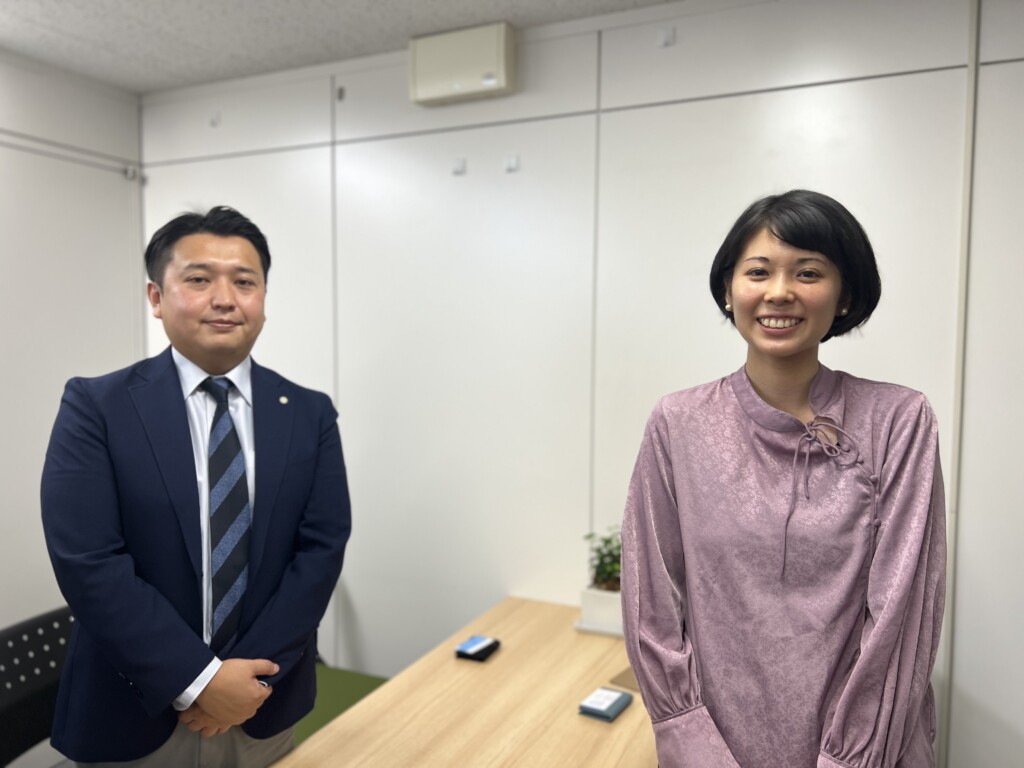
The profession of a judicial scrivener may not be a familiar one, but through this interview, we were able to see that they are indeed a compassionate presence that reaches out to help when people are truly in need.
Oimachi Judicial Affairs Office has shown us that they are a judicial scrivener’s office that earnestly contemplates “how can we be of service?” by standing in their clients’ shoes, as evidenced by their efforts to understand the feelings of entrepreneurs by setting up their office all by themselves.
They are also proactive in web marketing and branding, and we feel strongly that their future evolution is something we cannot take our eyes off. We are truly thankful for the time they took to speak with us despite their busy schedule.
Profile of Mr. Igaya
Born on August 10, 1985, in Matsudo City, Chiba Prefecture. After graduating from university, he worked as a self-reliance support counselor for the homeless and ran his own business before passing the judicial scrivener examination in 2019. Following his experience working in a judicial scrivener’s office, he opened Oimachi Judicial Affairs Office in May 2022 with Mr. Miyama, also a judicial scrivener.
His hobbies include golf and playing the drums. The representative of Kontori, Mr. Iizuka, also has a hobby of playing the drums, but it is likely that Mr. Igaya is the more skilled of the two. He may look cool on the outside, but he has a very kind personality, and the more you get to know him, the more you can appreciate his good qualities.
Profile of Oimachi Judicial Affairs Office
| establishment | May 2022 |
| location | 〒140-0014 1-49-12 Oi, Shinagawa-ku, Tokyo Oimachi Building 7B |
| telephone number | 03-6303-7451 |
| FAX | 03-6303-7848 |
| number of employees | 2 |
| Business content | Registration of company establishment, registration of head office relocation, stock acquisition rights, class shares Organizational reorganization, registration of business purpose change, registration of officer change, issuance of offered shares (capital increase) |
| URL | https://oimachi-shihou.com |
御社の想いも、
このように語りませんか?
経営に対する熱い想いがある
この事業で成し遂げたいことがある
自分の経営哲学を言葉にしたい
そんな経営者の方を、コントリは探しています。
インタビュー・記事制作・公開、すべて無料。
条件は「熱い想い」があることだけです。
経営者インタビューに応募する
御社の「想い」を聞かせてください。
- インタビュー・記事制作・公開すべて無料
- 3営業日以内に審査結果をご連絡
- 売上規模・業種・知名度は不問
※無理な営業は一切いたしません
発信を自社で続けられる
仕組みを作りたい方へ
発信を「外注」から「内製化」へ



